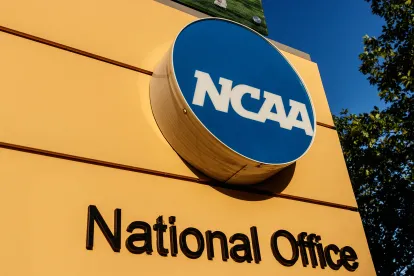On February 23, 2024, the U.S. District Court for the Eastern District of Tennessee issued a preliminary injunction in State of Tennessee and Commonwealth of Virginia v. National Collegiate Athletic Association, enjoining enforcement of the National Collegiate Athletic Association’s (NCAA) Name, Image, and Likeness (NIL) recruiting ban with respect to student-athletes.
Quick Hits
- A federal district court in Tennessee recently issued a preliminary injunction enjoining enforcement of the NCAA’s NIL-recruiting ban with respect to student-athletes.
- The court found that the ban limited student-athletes’ negotiation leverage and prevented them from understanding “their true NIL value.”
- The court held that the recruiting ban likely violated federal antitrust law and that irreparable harm would be done to the states’ student-athletes if the ban were permitted to remain in place.
- Due to the injunction, third-party entities, including boosters or collectives of boosters, may engage in discussions with recruits or potential transfer student-athletes regarding NIL compensation until the court reaches “a full and final decision on the merits.”
The NCAA is the governing body of college sports. The NCAA has approximately 1,100 member colleges and universities. Third parties (often termed “collectives”) work to arrange NIL opportunities for prospective student-athletes. A collective supports and promotes athletes and teams for a particular institution, but it is independent from the institution. To fund and facilitate NIL deals, collectives commonly solicit and receive donations from alumni, boosters (individuals who represent a school’s athletic interests), and businesses in the local community.
The “NIL-recruiting ban” refers to a series of guidance and rules from the NCAA classifying collectives as “boosters” to prevent them from negotiating with student-athletes during the recruiting and transfer process. Most recently, on January 10, 2024, the NCAA noted that the Division I Council had approved proposals relating to “student-athlete protections in NIL.” The NCAA stated that schools and collectives “would continue to be prohibited from engaging in NIL discussions with prospects or potential transfer student-athletes.”
The State of Tennessee and Commonwealth of Virginia filed a lawsuit on behalf of their student-athletes, challenging the NCAA’s NIL-recruiting ban. They asserted that the NCAA’s prohibition violated federal antitrust law and harmed student-athletes. The states argued that without the give and take of a free market, student-athletes have no knowledge of their true NIL value. The states also asserted that this suppression of negotiating leverage and consequent lack of knowledge harmed student-athletes.
The Court’s Analysis
The court agreed with the State of Tennessee and Commonwealth of Virginia, holding that they were likely to succeed in their lawsuit. The court found that the NIL-recruiting ban “suppresses price competition by limiting [student-athletes’] negotiation leverage and, as a result, knowledge of value.” The court noted that the Supreme Court of the United States had found a similar agreement to be anticompetitive “[o]n its face.”
The court rejected the NCAA’s claim that the NIL-recruiting ban preserves college athletics as a unique offering and wrote that the NCAA had “fail[ed] to show how the timing of when a student-athlete enters such an [NIL] agreement would destroy the goal of preserving amateurism.” The court found that less-restrictive rules, such as minimum credit hour requirements and grade-point averages, already existed within the NCAA bylaws to ensure the NCAA’s stated goal.
The court concluded by pointing to the windows of time that student-athletes have to commit to a school and observed the following:
It is during these limited time periods that student-athletes have the most negotiating leverage with NIL collectives and the best chance to realize their true NIL value. Now that the NCAA allows it, it is undeniable that NIL compensation is an important factor for some student-athletes to consider during the recruiting process. It would be difficult, if not impossible, to recreate this negotiating environment after the signing periods close or after a student-athlete begins their college career at a particular school. Each student-athlete’s NIL value is unique.
Key Takeaways
The court’s ruling provides clarity to member schools and collectives that were concerned about compliance with the NIL-recruiting ban. While member schools are still prohibited from engaging in NIL discussions with prospective student-athletes or potential transfer student-athletes or compensating student-athletes for their NIL, third party entities—including boosters or collectives of boosters—are allowed to engage in such activity due to the injunction.




 />i
/>i

